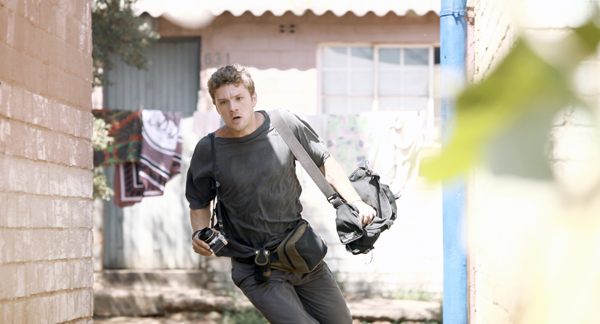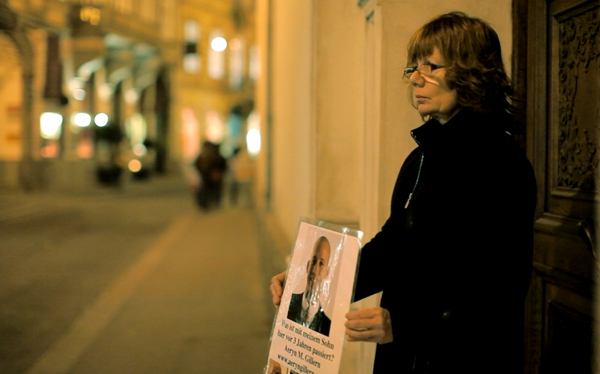|
Reviews of Recent Independent, Foreign, & Documentary Films in Theaters and DVD/Home Video

Odds
and Ends from the
Tribeca Film Festival The Bang Bang Club is an action-packed thriller about a group of four wartime photojournalists working in apartheid-era South Africa. It’s like Top Gun for today’s socially aware audience. With its almost episodic plot, the film tells the true-life story of how this daring bunch reconciles a passion for the work, a yearning for stardom, and a moral imperative to remain true to their embattled subjects. Ryan Philippe and Malin Ackerman head an exciting young cast that deliberately emphasizes a controversial notion of how middle-class white Westerners, like the ones here, tend to exploit Third World conflicts. Steven Silver, who wrote and directed, responsibly overstates his thesis here, and after Restrepo director Tim Hetherington’s tragic death covering the Libyan conflict, films like this one couldn’t get any more pertinent. Now available On Demand until June 23. The eponymous rap group, their rise to fame, and the creative differences that ended their short, celebrated career are the subject of Beats, Rhymes, and Life: The Travels of a Tribe Called Quest. Actor and funny man Michael Rapaport directs this loving interview documentary that tells the hip-hop group’s story in their own words. From turmoil between the two front men to the hot-and-cold relationship with backup vocalist Jarobi White, Rapaport brings us inside this beloved group (one of his all-time favorites). You can’t ask for a better-spoken foursome than Tribe, and anyone interested in either the group or the genre should absolutely give this one a watch. It will be released later this summer by Sony Pictures Classics. Roadie by Michael Cuesta (director of L.I.E. and Twelve and Holding, both excellent) is stunning at times. At other times, it’s not. Jimmy Testagross (Ron Eldard) is a burned out roadie, freshly booted off his latest tour, and without a lot of work options, he returns home to his modest Queens neighborhood. Fearing the judgments of his mother and his high school friends, he lies about his position with the band, telling them he’s the manager. After a clunky, awkward start, particularly the scenes between Testagross and his aging mother, Roadie eventually finds more thematic complexity as he wrestles with his self-confidence and the all-too-familiar process of proving his own success to his high school rivals. Watch for a spot-on Bobby Cannavale, as the former neighborhood bully, who clearly outshines the rest of this pretty average cast. Music video director Alma Har’el finds a Gummo-esque fascination in a California town time forgot, Bombay Beach, which lies on the coast of the once-beautiful but now destitute Salton Sea. Residents of interest include a former gun-toting explosives enthusiast and his dysfunctional family, a high school football star, and an aging cigarette bootlegger, whose every word, at first, sounds sagely until it’s mostly revealed as mumbo jumbo. This is indicative of the film as a whole. Har’el shoots this doc in a very stylized way, often with shallow depths of field and deliberately expressionistic frames, seemingly adding a measure of importance to each sequence. It’s not clear until somewhere in the second half that her subjects might as well be any random cross section of any impoverished town in America, save for the bizarre lack of municipal infrastructure and plenitude of dead fish. One wonders whether it’s even worth calling a fire truck, for instance. If this is America, what does that mean for this country? The film won the festival’s best documentary award. Underwater Love, the “pink film” spoof directed by Shinji Imaoka and shot by Christopher Doyle, is a perplexing take of that inanely nicknamed softcore genre. Pretty stereotypically Japanese, it features childlike characters, folkloric creatures, and pornography. Doyle puts in excellent work here as usual, shooting the hammy make-up effects in a clever fashion that’s somewhere between realistic and expressionistic, and lending the myth of a water creature some validity, despite an absurdist plot and several incomprehensible musical sequences. It’ll take a little Japanese pop culture appreciation to dig this one. Go see Like Water if you’re a mixed martial arts fan. Otherwise, there’s not a lot to appreciate. The current undefeated champion, Anderson Silva, is a complete media dud. He’s likened by director Pablo Croce to Bruce Lee, who was rarely glamorous yet always successful, but Silva has been criticized for the lack of flair in all of his many victories and for not helping to promote ultimate fighting, a sport that many feel is underappreciated throughout the world. Croce doesn’t do this sport any favors, though, allowing too much trash talk and the film to culminate in the contrived drama of a final showdown between Silva and challenger Chael Sonnen. (The film won the festival’s best new documentary director award.)
Too fully
explored is the wretched life of Dick Kuchera, a man of great
insignificance who somehow finds himself the star of his own
documentary. In Despicable Dick and Righteous Richard, our
anti-hero completes the all-important step to recovery from
addiction in which he lists the people he’s wronged throughout his life
and undertakes to make amends. Dick, a lifelong partier
and womanizer, is as self-centered as they come, and he has pissed off
just about everyone he’s ever come in contact with, and this would
ordinarily be an honorable pursuit if he didn’t obviously delight so
much in talking about himself and his misdeeds. Director Joshua Neale
offers a film that’s more like an extended episode of Intervention,
giving this slug a far grander stage than he deserves, with precious
little insight into the psychology of drug and alcohol abuse.
Michael Lee
Tribeca Film Festival, Part 1,
Tribeca Film Festival, Part 2,
Tribeca Film Festival, Part 3
|


